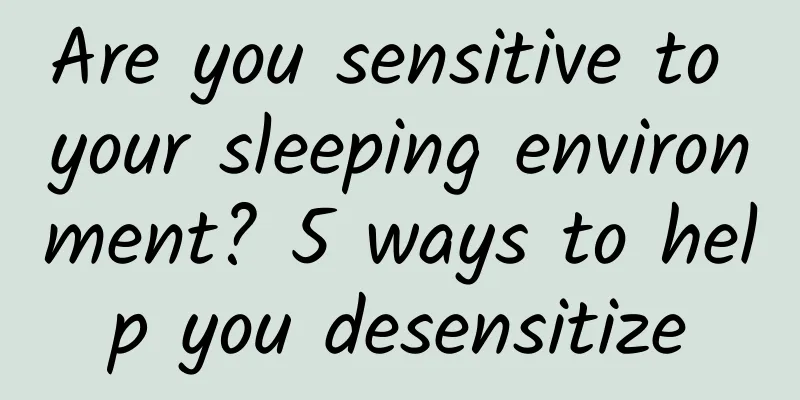Are you sensitive to your sleeping environment? 5 ways to help you desensitize

|
There are many factors that affect sleep, including age, alcohol, cigarettes, caffeine, overwork, and emotions. Some people are extremely sensitive to their sleeping environment. Some people are "stubborn" to their bed, some wake up at the slightest noise, and some people can't sleep all night after changing to a new environment on a business trip... If you are also disturbed by the environment, resulting in poor sleep quality, then this expert science video may inspire you! Faced with sensitive environmental factors, how can we improve our sleep quality? Let us follow the explanation of Jia Fujun, chief physician of the Department of Psychology and Psychiatry of Guangdong Provincial People's Hospital, and get 5 simple and effective ways to improve it! Spend 3 minutes to "unlock" 5 ways to improve What are the sensitive factors of the sleeping environment? There are many factors that may affect the sleep environment, and each person may be different, so you need to find the factors that affect your sleep. For example, noise, temperature, humidity, light, the hardness or comfort of bedding, as well as the environment of the bedroom, the layout of furniture, etc., may all be sensitive factors that cause poor sleep. What should I do if I am sensitive to the sleeping environment? 01 Subjective diversion of attention When faced with sensitive factors that you cannot eliminate, try not to think about them. This way, your attention will not be focused on the interfering factors, and you can minimize the interference. 02 Do some exercise before going to bed Doing some exercise before going to bed can improve sleep quality and help eliminate interference from environmental factors. (Image source: Pexels) 03 Carry out gradual desensitization training If you are disturbed by a certain factor for a long time, you need to carry out gradual desensitization training. For example, if you are disturbed by a certain sound, then in a happy and stress-free state, you can try to actively accept these sounds, and slowly you will become less sensitive to this sound. 04 Actively use psychological cues Through positive psychological suggestion, imagine yourself in a beautiful environment. Imagine yourself in a place that you like, whether it is the temperature or the scenery, and imagine yourself in a beautiful environment, which can also accelerate sleep. (Image source: Pexels) 05 Use short-acting hypnotic drugs If there is really no other way, you can also use some short-acting hypnotic drugs. The general environmental influence has a greater impact on falling asleep. We can take some short-acting hypnotic drugs to help shorten the time to fall asleep and reduce the impact of the environment on you. (Image source: Pexels) The quality of the sleeping environment directly affects a person's sleep quality. If you are sensitive to the sleeping environment, you might as well try the above five methods to self-regulate, help reduce the interference of the environment on sleep, and return to high-quality sleep! |
>>: Would you drink beer if it doesn't have alcohol?
Recommend
What does it mean when a woman dreams of eating a snake?
Snakes are very repugnant to many people. They ar...
In addition to adjusting diet and taking medication for children’s constipation, bowel training is crucial!
Author: Wu Jie, Chief Physician, National Childre...
What causes hip pain in women?
The structure of the hip joint is relatively comp...
How long after using the suppository can I have sex?
Xiaomi suppository is a medicine used for externa...
How long after giving birth can I drink tea?
It is best not to drink tea after giving birth. T...
These pure milk samples failed the test! Excessive consumption may cause...
Recently, the Market Supervision Bureau of Qingyu...
Early symptoms of menopause, you should know how to make correct judgments after reading this
The age at which each person reaches menopause is...
Why are my hands and feet itchy during the month?
Women will go through a difficult period during t...
The more you walk, the lower your risk of death?
Insufficient physical activity affects more than ...
High myopia is not just myopia? It is hereditary! It can cause many complications!
Author: Yin Lianrong, Chief Physician, Eye Hospit...
Why is there continuous vaginal discharge?
Vaginal discharge refers to the fluid discharged ...
The temperature dropped sharply, and the 70-year-old man insisted on morning exercise, and danger came
"He often didn't listen to my advice. He...
Where are stretch marks most likely to appear?
Most pregnant mothers are worried about stretch m...
What is the water under a woman called?
During sexual intercourse, women will continuousl...
Weekly Science | Can refractive surgery cure myopia?
At present, the technology of myopia surgery in C...









